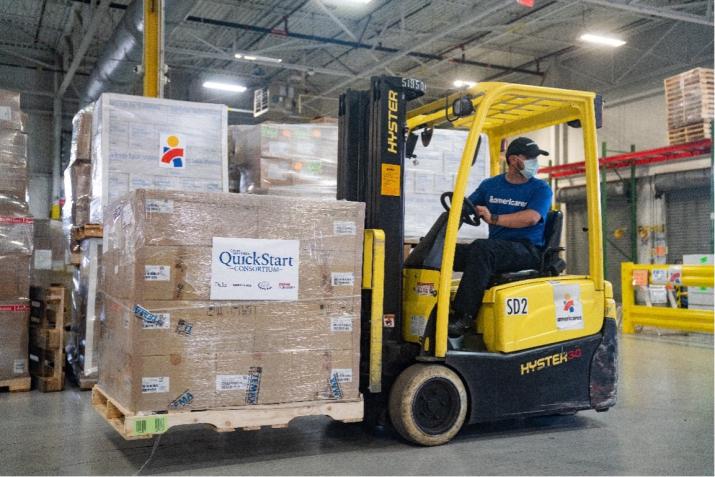
Courses of Paxlovid arrive in Zambia, the first shipment of COVID-19 medicines through the Quick Start Consortium.
Published January 25, 2023, last updated on January 31, 2023 under Around DGHI
One thousand courses of the COVID-19 medicine Paxlovid have been delivered to Zambia, the first shipment through a unique multinational partnership to improve access to COVID-19 treatments in low-income countries.
Paxlovid, an oral antiviral that has proven effective in minimizing illness from COVID-19, has been widely available in most high-income countries since late 2021, but it remains unavailable in many low- and middle-income countries. Last year, global health researchers at Duke worked with the Clinton Health Access Initiative, COVID Collaborative and Americares to launch the Quick Start Consortium, an effort to improve access to such life-saving medications.
The consortium is working with governments to open channels to low-cost antivirals and provide them to high-risk populations. The doses delivered to Zambia are part of a donation by Pfizer of 100,000 Paxlovid courses to be distributed through Quick Start.
“We recognize how critical access to oral antivirals is to saving lives,” said Lloyd Mulenga, director of Infectious Diseases at the Zambia Ministry of Health. “In addition to vaccination and other measures, access to oral antivirals is critically important to save lives, protect health systems during future surges, and manage COVID-19 over the coming months and years.”
The Ministry of Health is working with Quick Start and other partners to implement campaigns to test and treat people at high risk for COVID-19 infection and illness.
“We must have more equitable access to all interventions, and our collaboration with the Quick Start Consortium is helping us make progress toward that goal,” said Mulenga.
In addition to Zambia, Quick Start is working with Ghana, Kenya, Laos, Malawi, Nigeria, Rwanda, South Africa, Uganda and Zimbabwe. Paxlovid donations to these countries are in progress.
Researchers with the Duke Global Health Innovation Center (GHIC) are working with ministries in all of those countries to build public-sector capacity for COVID-19 testing and treatment. They have also established a learning network to share best practices in real-time and are helping to build access to low-cost generic medications.
“We are proud to support Zambia and other countries to launch and scale up access to safe and effective COVID-19 treatments,” said Krishna Udayakumar, M.D., founding director of GHIC and professor at the Duke Global Health Institute. “We aim to urgently strengthen the response to the current pandemic while also building more robust and resilient health systems that are better prepared for future threats.”
The consortium is supported by the Open Society Foundations, Pfizer and the Conrad N. Hilton Foundation.


